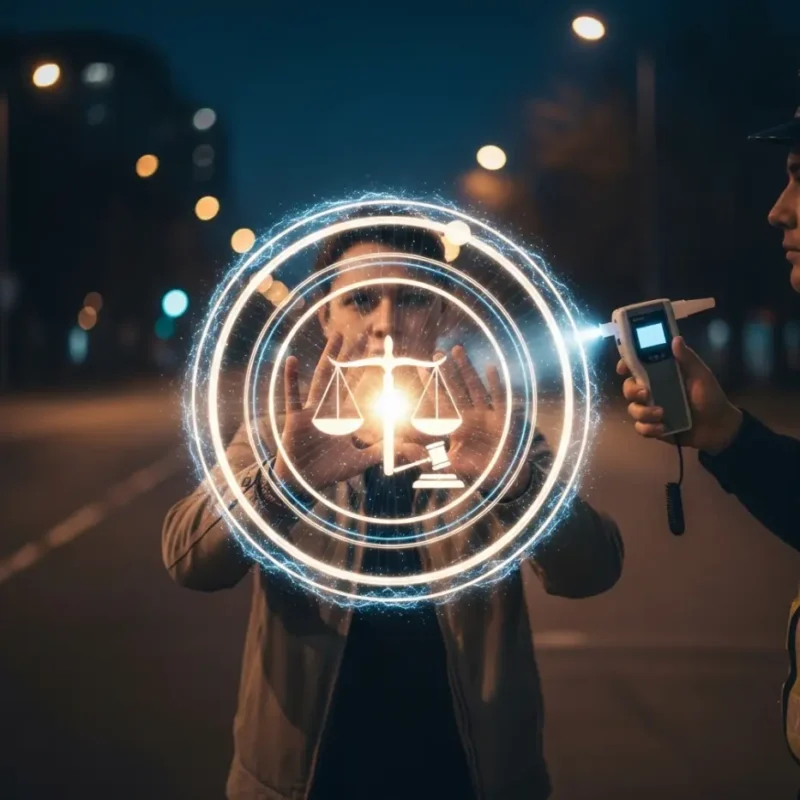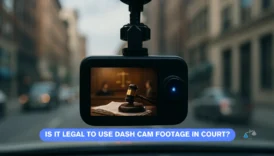Can I Refuse a Breathalyzer Test?

Being asked to take a breathalyzer test during a traffic stop can be intimidating, especially if you are unsure of your rights. While you technically can refuse the test, doing so often carries serious legal consequences. Most U.S. states have implied consent laws, meaning that by obtaining a driver’s license, you agree to submit to chemical testing if lawfully arrested for driving under the influence (DUI). Refusal may lead to license suspension, fines, or even harsher penalties than failing the test itself. Understanding the laws surrounding breathalyzer tests is essential before deciding how to respond during a DUI stop.
What Is a Breathalyzer Test?
A breathalyzer test is a chemical test used by law enforcement to measure the concentration of alcohol in a person’s breath, which is then used to estimate blood alcohol concentration (BAC). These tests are a common tool in enforcing driving under the influence (DUI) and driving while intoxicated (DWI) laws across the United States and many other countries.
How It Works
- Science Behind It: When alcohol is consumed, it is absorbed into the bloodstream and eventually exhaled through the lungs. The device captures a breath sample and uses infrared spectroscopy or fuel cell technology to determine BAC levels.
- BAC Measurement: Results are typically displayed as a percentage (e.g., 0.08%), with most states setting 0.08% BAC as the legal limit for drivers over 21.
- Portable vs. Station Tests:
- Preliminary Breath Test (PBT): Handheld devices used at the roadside to establish probable cause for arrest. These may be less accurate but are fast and portable.
- Evidentiary Breath Test: Larger, more sophisticated machines usually administered at a police station. These results carry more weight in court.
Why Police Use Breathalyzers
- Efficiency: Breathalyzers provide quick results compared to waiting for blood test analysis.
- Probable Cause: A high reading justifies further legal action, such as arrest or additional testing.
- Legal Evidence: In many jurisdictions, certified breathalyzer results are admissible in court to prove DUI charges.
Limitations and Accuracy Issues
- Calibration Requirements: Devices must be regularly maintained and calibrated to ensure accuracy.
- False Positives: Certain medical conditions (like diabetes producing acetone in the breath) or even mouth alcohol from recent drinking or mouthwash can skew results.
- Environmental Factors: Temperature, radio frequency interference, or improper use can affect readings.
Example Scenario
An officer stops a driver for swerving. During the stop, the officer observes slurred speech and the smell of alcohol. The driver is asked to blow into a roadside breathalyzer. The device shows a BAC of 0.10%. Based on this result, the officer arrests the driver and conducts a more accurate test at the station.
Why Understanding Matters
Breathalyzer tests are not just routine tools—they are legally binding pieces of evidence that can impact your license, insurance, employment, and even criminal record. Knowing how they work helps drivers understand the gravity of refusing or failing such a test.
Implied Consent Laws Explained
One of the most important legal concepts surrounding DUI enforcement is implied consent. These laws state that by choosing to drive on public roads and holding a driver’s license, you automatically agree to submit to chemical testing—such as a breathalyzer, blood, or urine test—if lawfully arrested on suspicion of driving under the influence.
The Legal Foundation
- State Laws: Every U.S. state has its own implied consent statute. While details vary, the principle is universal: driving is considered a privilege, not an absolute right.
- Condition of Licensing: Obtaining a driver’s license comes with the condition that you agree to chemical testing if stopped under lawful suspicion.
- Notification: Many states require officers to read an “implied consent advisory” before administering the test, warning drivers of the consequences of refusal.
Why Implied Consent Exists
- Public Safety: The goal is to deter drunk driving and ensure swift, reliable evidence collection.
- Efficiency: Without implied consent, police would need to obtain a warrant for every suspected DUI, which would be impractical.
- Accountability: Drivers cannot benefit from the privilege of driving while avoiding responsibility when suspected of impairment.
How It Works in Practice
- During a Stop: An officer observes signs of impairment—erratic driving, slurred speech, odor of alcohol—and lawfully arrests the driver.
- Request for Testing: The officer requests a breathalyzer or another chemical test.
- Consequences of Refusal: If the driver refuses, the officer informs them of penalties (license suspension, fines, etc.), which are applied even if the driver is not convicted of DUI.
Differences Across States
- License Suspension Periods: Some states impose a 6-month suspension for refusal; others may go up to a year or more for repeat offenses.
- Criminal Penalties: A few states treat refusal itself as a separate misdemeanor offense.
- Test Type: While breath tests are most common, some states allow refusal of the preliminary roadside test but require submission to station-administered chemical tests.
Example Scenario
A driver in Florida is pulled over for suspected drunk driving. When asked to take a breathalyzer, the driver refuses. Under Florida’s implied consent law, the driver immediately faces a one-year license suspension, even if they are later found not guilty of DUI.
Key Point
Implied consent laws make it clear: refusing a breathalyzer is not a free pass. The refusal itself carries automatic penalties, often as severe—or more severe—than failing the test.
Consequences of Refusing a Breathalyzer Test
Refusing a breathalyzer test may seem like a way to avoid immediate evidence of impairment, but in reality, it triggers serious and automatic consequences. Thanks to implied consent laws, refusal often results in penalties that can be just as severe—or even harsher—than failing the test itself.
Administrative Penalties
- License Suspension: Most states impose an automatic suspension of driving privileges, typically ranging from 6 months to 1 year for a first refusal.
- Repeat Refusals: Subsequent refusals may lead to longer suspensions, sometimes up to 2–3 years.
- Ignition Interlock Devices: Some jurisdictions require drivers who refuse tests to install an ignition interlock device (IID) before regaining their license.
Criminal Consequences
- Separate Offense in Some States: In states like Minnesota and Nebraska, refusal itself can be prosecuted as a misdemeanor or even a felony if coupled with prior DUI convictions.
- Enhanced Penalties: Refusal can lead to harsher sentencing if convicted of DUI later. Prosecutors may argue that refusal indicates consciousness of guilt.
Court Implications
- Use in Trial: In many states, the fact that a driver refused testing can be introduced as evidence in court.
- Jury Perception: Refusal may create a negative impression, suggesting the driver had something to hide.
Insurance Consequences
- Refusing a breathalyzer often leads to higher insurance premiums.
- Some insurers may cancel coverage entirely, classifying the driver as high-risk.
Example Scenario
A driver in New York refuses a breathalyzer test during a DUI stop. As a result:
- Their license is immediately suspended for one year.
- They must pay a $500 civil penalty.
- If later convicted of DUI, the refusal may be used against them in court.
Why Refusal Can Be Riskier
While some believe refusing prevents solid evidence, it often creates a double penalty: you lose your license and face consequences even without a DUI conviction. For many drivers, refusal ends up being more damaging in the long run than taking—and even failing—the test.
Administrative vs. Criminal Penalties
When a driver refuses a breathalyzer test, the resulting penalties typically fall into two categories: administrative penalties imposed by the Department of Motor Vehicles (DMV) or licensing authority, and criminal penalties imposed by the courts. Understanding the difference helps clarify how refusal can impact both driving privileges and broader legal outcomes.
Administrative Penalties
These are handled outside of criminal court, usually by the state’s DMV or equivalent agency. They are considered civil consequences and occur automatically upon refusal.
- License Suspension: In most states, a first-time refusal leads to a suspension of 6–12 months. Repeat refusals often result in longer suspensions.
- Fines and Fees: Drivers may face administrative fines and reinstatement fees to recover their license.
- Ignition Interlock Device (IID): Some states require IID installation before reinstating driving privileges.
- No Trial Needed: Administrative penalties are automatic; they do not require a criminal conviction.
Criminal Penalties
In addition to DMV actions, refusal may carry criminal consequences, especially in states that treat refusal as a separate offense.
- Misdemeanor or Felony Charges: In states like Nebraska or Minnesota, refusal can itself be charged as a crime.
- Jail Time: Convictions for refusal may result in mandatory jail sentences, particularly for repeat offenders.
- Enhanced DUI Sentences: If a driver is later convicted of DUI, refusal can be used to increase penalties. Courts often interpret refusal as a sign of attempting to avoid evidence collection.
How Administrative and Criminal Penalties Work Together
It is possible to face both administrative and criminal consequences.
- Example: A driver in California refuses a breathalyzer. The DMV automatically suspends their license for one year (administrative). If the driver is later convicted of DUI, the court may add fines, probation, or jail time (criminal).
Table: Administrative vs. Criminal Penalties
| Aspect | Administrative Penalties (DMV) | Criminal Penalties (Court) |
|---|---|---|
| Who Imposes Them | DMV or licensing authority | Criminal court |
| License Suspension | Automatic (6–12 months for first offense) | Possible, in addition to DMV penalties |
| Fines | Civil fees, reinstatement costs | Criminal fines imposed at sentencing |
| Jail Time | None | Possible, especially for repeat offenses |
| Burden of Proof | Automatic, no trial required | Must be proven beyond a reasonable doubt |
Example Scenario
A driver in Illinois refuses a breathalyzer test. Immediately, their license is suspended for 12 months by the DMV. Later, the driver is convicted of DUI in criminal court, resulting in fines and probation. This shows how refusal can trigger two layers of penalties—one administrative, one criminal.
Refusal vs. Failing the Test: Which Is Worse?
When stopped for suspected drunk driving, many drivers wonder whether it is smarter to refuse a breathalyzer test or to take it and risk failing. The truth is, both options carry significant consequences, but in many cases, refusing can be just as damaging—or even more so—than failing.
Legal Consequences of Failing the Test
- DUI Charges: A failed test showing a BAC at or above the legal limit (0.08% in most states) provides prosecutors with strong evidence for a DUI charge.
- License Suspension: Most states impose license suspensions for failing a breath test, though often shorter than those for refusal (e.g., 90 days vs. 1 year).
- Court Evidence: Breathalyzer results are admissible in court, making a conviction more likely.
- Criminal Record: A DUI conviction carries lasting consequences, including fines, probation, mandatory alcohol education, and possible jail time.
Legal Consequences of Refusal
- Automatic License Suspension: In many states, refusal triggers a longer suspension than failing.
- Possible Separate Offense: Some states treat refusal as a criminal act, adding charges on top of the DUI suspicion.
- Admissibility of Refusal: Prosecutors can argue in court that refusal shows consciousness of guilt.
- Harsher Sentencing: Judges may impose stricter penalties if refusal is combined with a DUI conviction.
Comparing Outcomes
| Factor | Failing the Test | Refusing the Test |
|---|---|---|
| License Suspension | 90 days – 6 months (varies by state) | 6 months – 1 year (longer in many states) |
| Evidence in Court | Strong BAC evidence against you | Refusal used as “consciousness of guilt” |
| Criminal Charges | DUI charges based on BAC | Possible separate refusal offense |
| Sentencing Impact | Standard DUI penalties | Often enhanced DUI penalties |
| Insurance Consequences | Increased premiums, possible cancellation | Increased premiums, possible cancellation |
Practical Considerations
- Failing the Test: Provides prosecutors with concrete evidence, making convictions more straightforward.
- Refusing the Test: May seem like protection, but refusal creates automatic penalties and can still be used against you.
- Driver’s Choice: In some situations, defense attorneys argue that failing the test may allow for better legal strategies (e.g., challenging calibration, accuracy, or officer conduct), while refusal leaves fewer options.
Example Scenario
A driver in California refuses a breathalyzer. Their license is suspended for one year. If they had taken the test and failed with a BAC of 0.09%, their suspension would have been only 4 months. In this case, refusal led to a harsher outcome.
Can Police Obtain a Warrant for a Blood Test?
When a driver refuses a breathalyzer test, many assume that police have no further options to determine blood alcohol concentration (BAC). However, this is not the case. In most jurisdictions, officers can obtain a warrant for a blood test, and courts have consistently upheld this process as lawful under certain conditions.
The Legal Authority
- Supreme Court Rulings:
- In Missouri v. McNeely (2013), the Court ruled that police must generally obtain a warrant before drawing blood, except in urgent circumstances.
- In Birchfield v. North Dakota (2016), the Court confirmed that while breath tests may be mandatory under implied consent laws, blood tests are more intrusive and typically require a warrant.
- Probable Cause Requirement: Police must demonstrate probable cause (e.g., evidence of impaired driving) when requesting a warrant.
When Warrants Are Used
- Refusal of Breath Test: If a driver refuses the breathalyzer, police often request a judge’s approval for a blood draw.
- Serious Accidents: In cases involving injury or death, officers are more likely to seek a warrant immediately.
- Medical Circumstances: If a suspect is unconscious, police may pursue a warrant for hospital blood tests.
How the Process Works
- Officers submit an electronic or verbal request to a judge.
- Judges are often available 24/7 to review warrant requests.
- Once approved, a licensed medical professional draws the blood sample.
Why Blood Tests Are Powerful Evidence
- Accuracy: Blood tests are generally more accurate than breath tests and harder to challenge in court.
- Time Sensitivity: Alcohol dissipates from the bloodstream over time, which is why officers act quickly.
- Broader Testing: Blood samples can also detect drugs, not just alcohol.
Example Scenario
A driver in Texas refuses to take a roadside breathalyzer. The officer applies for a warrant electronically and receives approval within minutes. The driver is taken to a hospital, where a nurse draws blood showing a BAC of 0.12%. That evidence is then used in court.
Practical Impact
Refusing a breathalyzer rarely prevents evidence collection. With modern technology, police can secure warrants quickly, making refusal an ineffective strategy in most cases.
How Refusal Impacts Your Driver’s License
One of the most immediate and significant consequences of refusing a breathalyzer test is the effect it has on your driver’s license. Even if you are never convicted of DUI, refusal alone can trigger automatic administrative penalties under implied consent laws.
Automatic Suspension
- First Offense: In most states, refusing a breathalyzer results in a license suspension of 6 months to 1 year.
- Repeat Offenses: A second or third refusal often leads to even longer suspensions, sometimes 2–3 years.
- Hard Suspension: In some states, there is no possibility of obtaining a restricted license for a portion of the suspension period.
Restricted or Hardship Licenses
- Some jurisdictions allow drivers to apply for a restricted license, which permits limited driving (such as commuting to work or school).
- Others impose a mandatory hard suspension, meaning no driving privileges at all during the suspension period.
Ignition Interlock Devices (IID)
- Many states require the installation of an IID before reinstating full driving privileges.
- These devices require a clean breath sample before the car will start and may require rolling retests while driving.
DMV Hearings
- Drivers typically have the right to request an administrative hearing with the DMV to contest the suspension.
- However, these hearings are civil, not criminal, and the burden of proof is much lower. Winning is often difficult unless procedural errors occurred.
Example Scenario
A driver in Arizona refuses a breathalyzer test. Even though the driver later beats the DUI charge in court, the state’s DMV still enforces a 1-year license suspension due to refusal. The driver must also install an IID before full reinstatement.
Long-Term Impact
- Insurance Premiums: Suspensions for refusal often trigger steep increases in car insurance rates.
- Employment Issues: Jobs that require driving (rideshare, delivery, trucking) may be lost during the suspension period.
- Permanent Record: Even administrative suspensions may appear on driving records, impacting future legal proceedings.
Insurance and Employment Consequences of Refusal
Refusing a breathalyzer test doesn’t just carry legal and administrative penalties—it can also create serious ripple effects in your personal and professional life. Two of the most significant areas impacted are auto insurance and employment opportunities, both of which can be long-term concerns even after license reinstatement.
Insurance Consequences
- Higher Premiums: Insurance companies view drivers who refuse breathalyzer tests as high-risk, often leading to steep premium increases.
- Policy Cancellation: Some insurers may cancel coverage entirely after a refusal-related suspension.
- SR-22 Requirement: Many states require drivers with suspensions due to refusal to file an SR-22 form, which certifies financial responsibility. This makes insurance more expensive and harder to obtain.
- Lasting Impact: Even if you avoid a DUI conviction, the refusal itself often stays on your driving record for years, affecting rates long-term.
Employment Consequences
- Driving-Related Jobs: Professions requiring a clean driving record (truck drivers, delivery drivers, rideshare contractors) may deny employment or terminate workers with refusal suspensions.
- Professional Licensing: Certain careers—such as pilots, healthcare workers, or law enforcement—may require background checks that flag refusal-related suspensions.
- Reputation Concerns: Employers may view a refusal as a sign of risk-taking or poor judgment, even without a DUI conviction.
- Commercial Drivers (CDL): CDL holders face especially harsh consequences. A refusal can mean disqualification for up to one year, and longer for repeat incidents.
Financial Consequences Beyond Insurance
- Job Loss: If driving is a core part of employment, refusal-related suspensions can result in lost wages.
- Increased Legal Costs: Contesting a suspension in DMV hearings or court adds legal expenses on top of insurance hikes.
Example Scenario
A rideshare driver in Illinois refuses a breathalyzer during a traffic stop. Their license is suspended for one year. Even though no DUI conviction follows, the suspension disqualifies them from driving for Uber or Lyft, eliminating their primary source of income. Their insurance also increases by 60% once reinstated.
Why It Matters
Refusal doesn’t just affect the courtroom—it has real-world consequences that can harm financial stability, career prospects, and future mobility. For many drivers, the insurance and employment fallout of refusal is even more damaging than the legal penalties.
Defenses and Legal Options After Refusal
Refusing a breathalyzer test can lead to immediate penalties, but that doesn’t mean you are without options. With the help of an attorney, it may be possible to challenge the refusal, reduce penalties, or negotiate alternative outcomes.
Common Legal Defenses
- Improper Traffic Stop
- If the officer lacked reasonable suspicion to pull you over, any subsequent refusal may be challenged as unlawful.
- Example: Being stopped without a valid reason (such as no traffic violation) could invalidate the case.
- Failure to Read Implied Consent Advisory
- Officers are often required to inform drivers of the consequences of refusal.
- If the officer failed to provide this warning, the suspension may be overturned.
- Medical or Physical Inability
- A driver with asthma, COPD, or another medical condition may be unable to provide a valid breath sample.
- In such cases, refusal might be excused if properly documented.
- Device Malfunction
- If the machine was not calibrated or maintained properly, it could lead to an invalid request for testing.
- Defense attorneys often subpoena maintenance logs to investigate errors.
- Unlawful Arrest
- Refusal penalties apply only after a lawful arrest for suspected DUI. If the arrest itself was unlawful, the refusal consequences may not stand.
Legal Options
- Request a DMV Hearing:
- Most states allow drivers to contest their license suspension at an administrative hearing.
- Deadlines are strict—often within 10–30 days of arrest.
- Plea Bargains:
- In some cases, prosecutors may reduce DUI charges in exchange for guilty pleas on lesser offenses, softening penalties.
- Challenging in Court:
- A defense attorney may argue that refusal was not intentional (e.g., due to misunderstanding instructions).
- Alternative Programs:
- Some states offer diversion or alcohol education programs that can reduce suspensions or penalties.
Example Scenario
A driver in Colorado refuses a breathalyzer but claims they have a lung condition that prevented them from completing the test. Their attorney provides medical records at the DMV hearing, resulting in a reduced suspension.
Practical Steps After Refusal
- Contact an experienced DUI attorney immediately.
- Request your DMV hearing before the deadline expires.
- Gather medical records, witness statements, or other evidence supporting your case.
- Explore whether plea deals or diversion programs are available in your state.
Final Thoughts on Breathalyzer Refusal
Refusing a breathalyzer test is not a simple decision—it carries consequences that can extend far beyond the traffic stop itself. While some drivers believe refusal protects them from DUI charges, in reality, refusal often leads to automatic license suspensions, higher penalties, and additional legal complications.
The Balancing Act
- Refusing the Test: May seem like a way to avoid evidence, but implied consent laws ensure refusal itself brings punishment.
- Taking the Test: Provides evidence that can be challenged in court, but a failed result still makes a DUI conviction more likely.
- Outcome Depends on Strategy: In many cases, defense attorneys prefer having test results they can dispute rather than dealing with the rigid penalties of refusal.
Why Knowledge Is Key
Drivers should understand:
- Refusal = Consequences: No matter what, refusal almost always triggers penalties.
- Police Can Still Get Evidence: With warrants for blood tests, refusal rarely prevents authorities from obtaining BAC results.
- Insurance and Career Impact: Beyond legal issues, refusal can harm your financial and professional life.
Long-Term Considerations
- First-Time Offenders: Refusal may result in harsher penalties than failing, including longer license suspensions.
- Repeat Offenders: Courts and DMVs treat repeat refusals severely, often with multi-year suspensions and potential jail time.
- CDL Holders: Commercial drivers face life-changing consequences—loss of a career—for refusing or failing tests.
Practical Guidance
- Stay calm and respectful during a DUI stop.
- Know your state’s implied consent laws before making a decision.
- If you do refuse, seek legal representation immediately to explore defenses and minimize damage.
Refusal may feel like a protective shield in the moment, but in most cases, it simply trades one set of problems for another. The smarter choice is often to comply with testing while planning to fight the results later with legal assistance.
Frequently Asked Questions (FAQs)
1. Can I legally refuse a breathalyzer test?
Yes, you can refuse, but implied consent laws mean refusal almost always results in automatic penalties like license suspension.
2. What happens if I refuse a breathalyzer for the first time?
Most states suspend your license for 6–12 months, even if you are not convicted of DUI.
3. Is refusing a breathalyzer worse than failing?
Often yes. Refusal usually leads to harsher license suspensions and may be used against you in court.
4. Can I be charged with a crime for refusal alone?
In some states, refusal is treated as a separate misdemeanor or felony offense, especially with prior DUI history.
5. Do implied consent laws apply in every state?
Yes, all U.S. states have implied consent laws, though the penalties for refusal vary.
6. Can police force me to take a blood test if I refuse the breathalyzer?
Yes, with a warrant. Courts allow officers to obtain rapid electronic warrants for blood draws.
7. Does refusal affect car insurance?
Yes. Refusal often leads to higher premiums, SR-22 requirements, or even cancellation of your policy.
8. Will my employer find out if I refuse a breathalyzer?
Possibly. Refusal-related suspensions appear on driving records, which employers may review, especially for driving-related jobs.
9. Can refusal evidence be used in court?
Yes. Prosecutors can argue that refusal indicates “consciousness of guilt,” even without BAC results.
10. Should I ever refuse a breathalyzer?
It depends on your state’s laws and your circumstances, but in most cases, refusal creates more problems than it solves. Speaking to a DUI attorney immediately is the best step after any stop.






